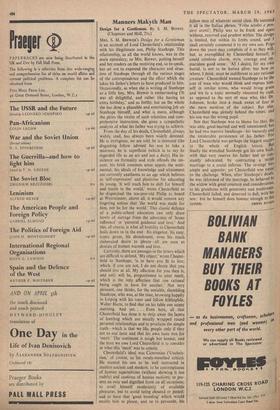Manners Makyth Man
MRS. S. M. BREWER'S Design for a Gentleman is an account of Lord Chesterfield's relationship with his illegitimate son, Philip Stanhope. This relationship, as all the world knows, was in the main epistolary; so Mrs. Brewer, putting herself and her readers on the receiving end, so to speak, has set out to expound the character and situa- tion of Stanhope through all the various stages of the correspondence and the effect which she takes his father's letters to have produced in him. Occasionally, as when she is writing of Stanhope as a little boy, Mrs. Brewer is embarrassing ('It was all delightful, and rather like having an extra birthday,' and so forth); but on the whole she has done a plausible and entertaining job on Stanhope himself, and what is more, although she pities the victim of such relentless and com- prehensive instruction, she gives a sympathetic analysis of what his father was trying to achieve.
From the day of his death, Chesterfield, always widely read, has always been widely detested. He is irreligious, we are told, he is immoral (the disgusting fellow advised his son to take a mistress), he is superficial (which is to say he regarded life as an art and not a duty). His in- sistence on formality and style offends the sin- cere; his brisk common sense appals the senti- mental; his ideals of knowledge and attainment are currently anathema to an age which believes in 'self-expression' and plasticine for educating its young. 'It will teach him to shift for himself and bustle in the world,' wrote Chesterfield as he dispatched the ten-year-old Philip to board at Westminster; above all, it would remove any lingering notion that 'the world was made for him, not he for the world.' This classic defence of a public-school education can only draw howls of outrage from the advocates of 'home influence' or 'parental guidance and love.' And this, of course, is what all hostility to Chesterfield boils down to in the end: his elegance, his easy, ironic prose, his detachment, even his much elaborated desire to please—all are seen as denials of human warmth and love.
Certainly, there are passages in the letters which are difficult to defend. 'My object,' wrote Chester- field to Stanhope, 'is to have you fit to live; which, if you are not, I do not desire that you should live at all. My affection for you then is, and only will be, proportioned to your merit, which is the only affection that one rational being ought to have for another.' Not very pleasant, one thinks, for the amiable, shambling Stanhope, who was, at the time, browsing happily in Leipzig with his tutor and fellow bibliophile, Walter Harte, to find that on his table one sunny morning. And yet. . . Even here, all that Chesterfield has done is to strip away the layers of humbug which are usually wrapped round personal relationships and to proclaim the simple truth—which is that we like people only if they are to our taste and that his own taste was for `merit,' The sentiment is tough but honest; and the least we owe Lord Chesterfield is to consider in what this 'merit' was to consist.
Chesterfield's ideal was Ciceronian ('Unchris- tian,' of course, to his mealy-mouthed critics). He wanted his son to be, well instructed in matters ancient and modern; to be contemptuous of human superstitions (without showing it too rudely) and cautious of human motives; to pre- sent an easy and dignified front on all occasions; to avail himself moderately of available pleasures. but to avoid being cheated or poxed; and to have that 'good breeding' which would enable him to please, and so to persuade, his fellow men of whatever social class. He summed it all in the Italian phrase, 'Volto sciolto e pen- sieri sfrelli; Philip was to be frank and open without, reserved and prudent within. The design is limited, but within its limits sound, and shall certainly commend it to my own son. Prigs down the years may complain of it as they will, but, as exemplified by Chesterfield himself, it could combine charm, style, courage and im- maculate good sense: 'All I desire, for my own burial, is not to be buried alive; but how or where, I think, must be indifferent to any rational creature ' Chesterfield wanted Stanhope to be the sort of man who would think and express him- self in similar terms, who would bring grace and wit to a topic normally obscured by cant, as opposed to the sort of man who, like 13[% Johnson, broke into a muck sweat of fear at the mere mention of the subject. But alas, Chesterfield was already behind the times; and his son was the wrong pupil. Not that Stanhope was to blame for that. He was able, good-hearted and well intentioned; but he had two massive handicaps—his bastardy and the intolerable persistence of his father. For Lord Chesterfield was perhaps the biggest nagger in the whole of English letters. But finally the wretched Stanhope got his own back, with that very reserve his father had so con- stantly advocated, by contracting a secret marriage to a social inferior. The revenge was, ample and apposite; yet Chesterfield was equal to the challenge. When, after Stanhope's death. he was informed of the marriage, he behaved 10 the widow with great courtesy and consideration, to his grandsons with generosity and tenderness. Chesterfield failed, and deserved to fail, with his son : but he himself does honour enough to his














































 Previous page
Previous page